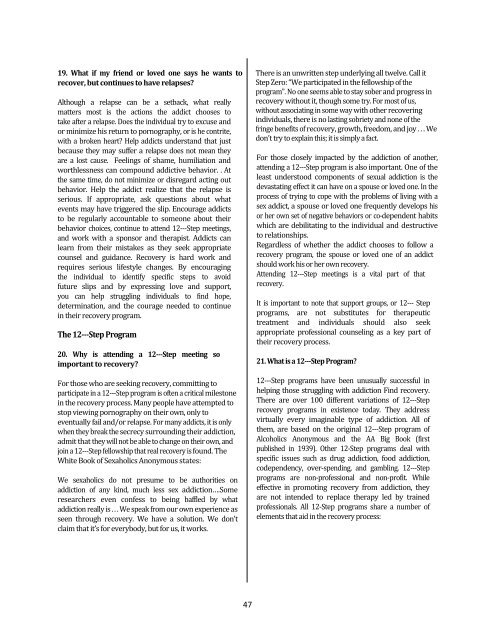Safety Net
Safety Net
Safety Net
You also want an ePaper? Increase the reach of your titles
YUMPU automatically turns print PDFs into web optimized ePapers that Google loves.
19. What if my friend or loved one says he wants to<br />
recover, but continues to have relapses?<br />
Although a relapse can be a setback, what really<br />
matters most is the actions the addict chooses to<br />
take after a relapse. Does the individual try to excuse and<br />
or minimize his return to pornography, or is he contrite,<br />
with a broken heart? Help addicts understand that just<br />
because they may suffer a relapse does not mean they<br />
are a lost cause. Feelings of shame, humiliation and<br />
worthlessness can compound addictive behavior. . At<br />
the same time, do not minimize or disregard acting out<br />
behavior. Help the addict realize that the relapse is<br />
serious. If appropriate, ask questions about what<br />
events may have triggered the slip. Encourage addicts<br />
to be regularly accountable to someone about their<br />
behavior choices, continue to attend 12-Step meetings,<br />
and work with a sponsor and therapist. Addicts can<br />
learn from their mistakes as they seek appropriate<br />
counsel and guidance. Recovery is hard work and<br />
requires serious lifestyle changes. By encouraging<br />
the individual to identify specific steps to avoid<br />
future slips and by expressing love and support,<br />
you can help struggling individuals to find hope,<br />
determination, and the courage needed to continue<br />
in their recovery program.<br />
The 12-Step Program<br />
20. Why is attending a 12-Step meeting so<br />
important to recovery?<br />
For those who are seeking recovery, committing to<br />
participate in a 12-Step program is often a critical milestone<br />
in the recovery process. Many people have attempted to<br />
stop viewing pornography on their own, only to<br />
eventually fail and/or relapse. For many addicts, it is only<br />
when they break the secrecy surrounding their addiction,<br />
admit that they will not be able to change on their own, and<br />
join a 12-Step fellowship that real recovery is found. The<br />
White Book of Sexaholics Anonymous states:<br />
We sexaholics do not presume to be authorities on<br />
addiction of any kind, much less sex addiction….Some<br />
researchers even confess to being baffled by what<br />
addiction really is . . . We speak from our own experience as<br />
seen through recovery. We have a solution. We don’t<br />
claim that it’s for everybody, but for us, it works.<br />
47<br />
There is an unwritten step underlying all twelve. Call it<br />
Step Zero: “We participated in the fellowship of the<br />
program”. No one seems able to stay sober and progress in<br />
recovery without it, though some try. For most of us,<br />
without associating in some way with other recovering<br />
individuals, there is no lasting sobriety and none of the<br />
fringe benefits of recovery, growth, freedom, and joy . . . We<br />
don’t try to explain this; it is simply a fact.<br />
For those closely impacted by the addiction of another,<br />
attending a 12-Step program is also important. One of the<br />
least understood components of sexual addiction is the<br />
devastating effect it can have on a spouse or loved one. In the<br />
process of trying to cope with the problems of living with a<br />
sex addict, a spouse or loved one frequently develops his<br />
or her own set of negative behaviors or co-dependent habits<br />
which are debilitating to the individual and destructive<br />
to relationships.<br />
Regardless of whether the addict chooses to follow a<br />
recovery program, the spouse or loved one of an addict<br />
should work his or her own recovery.<br />
Attending 12-Step meetings is a vital part of that<br />
recovery.<br />
It is important to note that support groups, or 12- Step<br />
programs, are not substitutes for therapeutic<br />
treatment and individuals should also seek<br />
appropriate professional counseling as a key part of<br />
their recovery process.<br />
21. What is a 12-Step Program?<br />
12-Step programs have been unusually successful in<br />
helping those struggling with addiction Find recovery.<br />
There are over 100 different variations of 12-Step<br />
recovery programs in existence today. They address<br />
virtually every imaginable type of addiction. All of<br />
them, are based on the original 12-Step program of<br />
Alcoholics Anonymous and the AA Big Book (first<br />
published in 1939). Other 12-Step programs deal with<br />
specific issues such as drug addiction, food addiction,<br />
codependency, over-spending, and gambling. 12-Step<br />
programs are non-professional and non-profit. While<br />
effective in promoting recovery from addiction, they<br />
are not intended to replace therapy led by trained<br />
professionals. All 12Step programs share a number of<br />
elements that aid in the recovery process:


